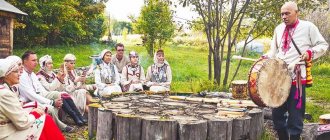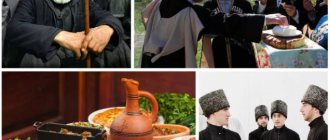Although Central Africa is something unknown to us, even though the pre-wedding traditions of different countries seem unusual and even wild to us, on the African continent marriage is the same reason for celebration as it is here. Moreover, an African wedding is accompanied by a huge number of rituals, which are unique to each nation.
The Svadebka.ws portal will tell you how weddings take place among different African tribes. We will also show photos and videos that some may find shocking, but at the same time no less interesting.
African wedding: matchmaking and engagement among different nations
There is not a single tribe where it is customary to announce one’s desire to get married publicly, to organize loud matchmaking and a magnificent engagement. Each tribe has its own traditions, but some of them are common to most people in Central Africa. Let's take a closer look at them.
Bride fee
If in the CIS countries the ransom is more of a theatrical performance for guests, which, moreover, is morally outdated, then in Africa the groom and his family literally pay the bride’s family. Each head of the family who gives his daughter in marriage determines the amount of the ransom himself. Some grooms can get off easily, while others have to work for years to save the required amount. And it often happens that by the time of the wedding, the potential bride has either already married someone else or has grown old.
Some African tribes have an interesting custom: there is the possibility of “loans” if the future son-in-law is promising. The groom gives part of the ransom before the wedding, and after the ceremony he pays the rest for several years. By the way, they don’t necessarily pay in money; fabrics and clothes, jewelry, and livestock are also suitable.
Interesting fact: in the Massai tribe, a groom can literally win a waiver from paying the ransom if he wins a high jump competition.
If the potential husband does not have the opportunity to earn a ransom, he will have to come to terms with the idea that his beloved will not become his wife. Such a radical way out of a situation as bride kidnapping is very rare among African tribes, as it is strictly punishable. The girl's relatives can take very cruel revenge on the risky groom.
Bride's wedding
Not only future husbands must prove their worth. Brides must also confirm the fact of their beauty, ability to care for a man and manage everyday life. From childhood, girls are taught to take care of themselves and take care of their face, hair and body. And by the age of 15, girls usually become wives.
Engagement
As for the betrothal, the scenario here is standard for most tribes that have approached “civilization.” The groom and his relatives come to the house of the bride’s parents, meet or communicate with them, and also give the future wife a ring as confirmation of the seriousness of their intentions.
After the wedding
After the wedding, the newlyweds should retire, but in most tribes the wedding night is a solemn moment, witnessed by the older women present in the room where the newlyweds went, and the tribesmen waiting outside.
In other tribes, the date of the wedding night may remain a secret to the groom, or this event brings together several couples who have just gotten married and want to be alone. In another village, the bride must resist as if she were fighting for her life.
She does not have the right to immediately give in to the groom. Their wedding night begins with real struggle. The tribesmen are sure that such a night is a real lesson, where newlyweds learn from each other the art of lovemaking. In Namibia, only the natural father has the right to tell the newlywed what she should do and how she should behave on her wedding night.
The Zulu people trust the mother of the bride, who, before sending her daughter to her young husband, dances with her and, after waiting for the girl to raise one leg high, looks under her skirt to make sure that her daughter is a virgin.
Preparation for the celebration
A wedding of African tribes is always a large-scale event that requires special preparation. Usually, preparations begin no later than a month and a half before the celebration. Most African tribes have interesting customs that will definitely seem strange to us:
- the bride spends a minimum of time in the sun and whitens her skin by rubbing it with the juices of various plants;
- henna designs are applied to the bride’s hands and feet, which is reminiscent of a similar tradition among Muslims, which has become a modern wedding ceremony in many European countries;
- the bride is carefully fattened, since in Africa fatness is an indicator of health, especially reproductive health.
If the bride could not be “fed up” to the required weight (which is determined by the groom), he can send her back to her parents after the wedding until she gains the missing kilograms.
About preparing and working with African contractors
It was a wedding for two. Finding myself in the role of a bride, already at the moment of trying on the dress I saw a picture of how everything should be - thanks to my organizational brain. Cheetahs, safaris, jeeps, endless savannah, these trees, like from the cartoon “The Lion King”... All this presented itself so clearly that it was decided to divide the trip into two parts - a wedding safari and almost a honeymoon in a luxury hotel in Zanzi. Thanks to co-contractors who were found in Africa itself, I was able to find out the necessary information, options and features of this entire event. There were a lot of restrictions, but in the end everything worked out exactly as we wanted.
Wedding traditions among African tribes
Tribal weddings in Africa last at least a week. Therefore, all guests invited to the celebration gain strength, because they will have to dance “till they drop” for seven whole days. This event is also an excellent occasion for bridesmaids to show off their luxurious outfits in order to please the groom's friends and, perhaps, get married soon too.
If the bride's friends strive to choose the most beautiful clothes, then what can we say about the future wife. African wedding dresses are distinguished by their special chic: the more colorful and bright they are, the more decor they have, the more beautiful the bride is considered. Moreover, during all the days of the celebration she must change several outfits, as well as constantly change jewelry. A large number of jewelry on the hands, neck and feet of the newlywed indicates her wealth.
African wedding traditions involve constant “musical accompaniment” throughout the celebration: both day and night. The sounds of tom-toms are not intended to entertain guests or accompany dances, but to scare away evil spirits.
Each tribe has its own wedding ceremony. For example, among the Samburu people, newlyweds walk through a crowd of relatives who spit at the newlyweds. This symbolizes getting rid of failures and material well-being. Before a wedding, the Zulus customarily pour hundreds of liters of beer directly onto the ground so that departed ancestors can also join in the celebration.
At a ceremony in the Bororo tribe, the bride must eat the paired entrails of a bull, and the groom must eat its testicles. This should help the couple have many children.
Wedding customs of the Zulu tribe
This tribe loves to celebrate weddings with beer. There are no celebrations here without this drink, especially weddings.
The Zulus pour beer into glasses and place it on the floor. This is a sign for relatives and friends to come to the wedding. Everyone who wants to come comes. Then the celebration begins.
The Zulu celebration itself is somewhat cruel. There is no need for sacrifice - either a goat or a cow is sacrificed. This is a kind of rite of passage for the groom to show his skills to the bride.
African wedding rituals can be somewhat unusual, for example, among the Zulus they use curse words. All participants in the celebration gather together, beat drums and insult each other with swear words.
Previously, the tribe pursued another strange tradition: it was possible to marry only a girl from an enemy clan.
Swazi wedding customs
There is a fun custom here that rather resembles a game. The groom's friends are trying to break through to the bride in order to kidnap her.
And everything would be fine, but instead of a ransom, you need to overcome... her girlfriends! And doing this, as it turned out, is not at all easy.
Wedding customs of the Yuruba tribe
Everything is more peaceful and civilized here. One amazing custom is the attire that must match between two categories of people.
The groom and guests, including relatives, on his side dress in one type of clothing, and the bride’s guests dress in another.
The ancient traditions of Africa thus suggest that during a wedding two different families are reunited.
Also, the bride and groom of the tribe must eat dried fish, pepper and honey, which is supposed to signify the different feelings that are present in the life of any family.
Advice for brides
These three days passed so quickly and brightly that only thanks to the photographs I realize that it was not a dream, we were in Africa and we were married by a Masai chief. The main ingredient of any wedding is the right attitude towards this day and the ability to enjoy it. With the right people it can't be any different. Dream, love and travel!
Photographer: Arseny Prusakov











